Pros and Cons of Brexit: Impact on Trade, FDI, Immigration, and Regulation
VerifiedAdded on 2023/06/13
|9
|2502
|139
AI Summary
This paper dissects the positive and negative impacts of Brexit with more emphasis on trade, regulation, supply of labour, FDI, and immigration.
Contribute Materials
Your contribution can guide someone’s learning journey. Share your
documents today.

Impact of Brexit 1
PROS AND CONS OF BREXIT
Name
Institution
Course
Tutor
City/State
Date
PROS AND CONS OF BREXIT
Name
Institution
Course
Tutor
City/State
Date
Secure Best Marks with AI Grader
Need help grading? Try our AI Grader for instant feedback on your assignments.
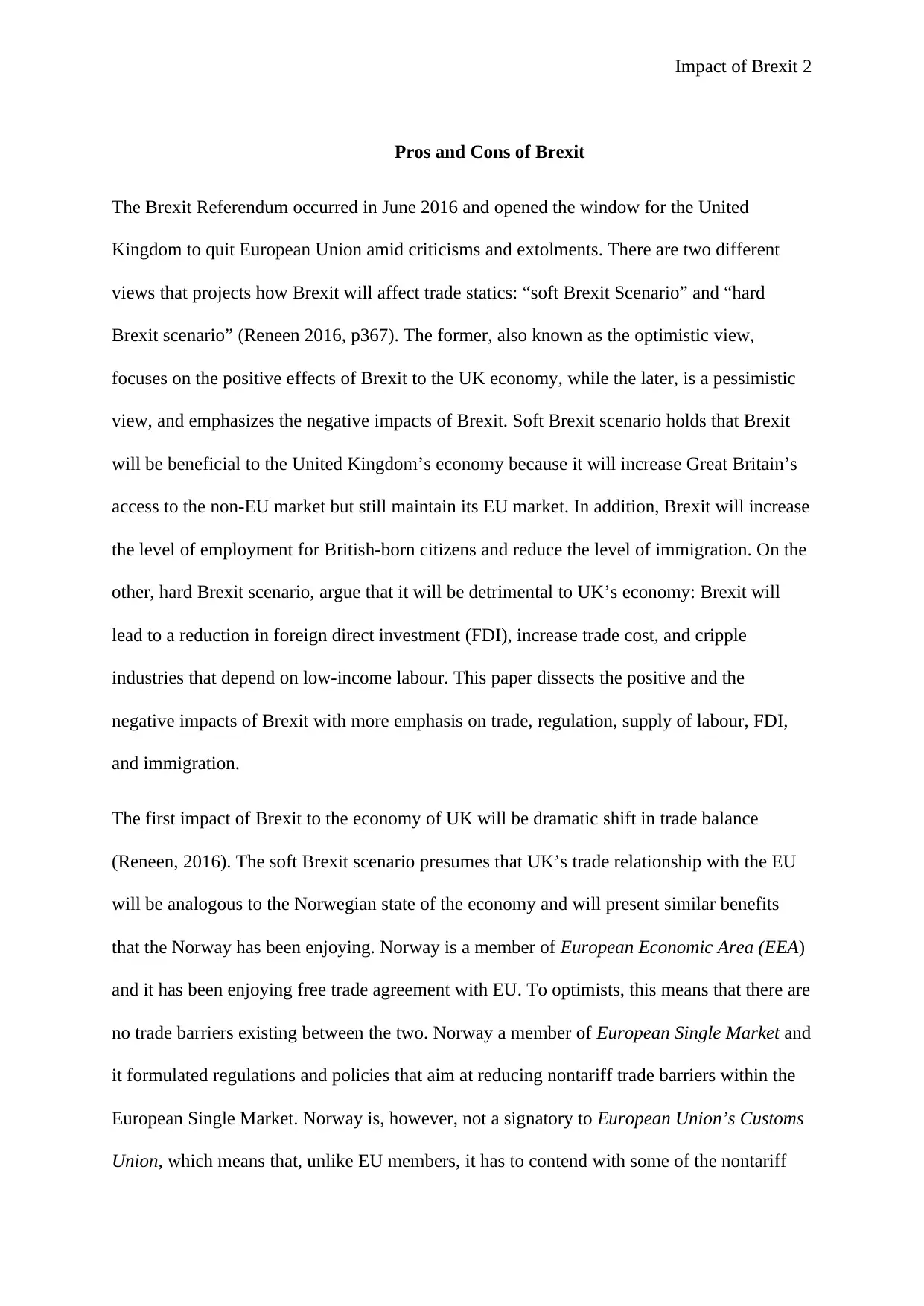
Impact of Brexit 2
Pros and Cons of Brexit
The Brexit Referendum occurred in June 2016 and opened the window for the United
Kingdom to quit European Union amid criticisms and extolments. There are two different
views that projects how Brexit will affect trade statics: “soft Brexit Scenario” and “hard
Brexit scenario” (Reneen 2016, p367). The former, also known as the optimistic view,
focuses on the positive effects of Brexit to the UK economy, while the later, is a pessimistic
view, and emphasizes the negative impacts of Brexit. Soft Brexit scenario holds that Brexit
will be beneficial to the United Kingdom’s economy because it will increase Great Britain’s
access to the non-EU market but still maintain its EU market. In addition, Brexit will increase
the level of employment for British-born citizens and reduce the level of immigration. On the
other, hard Brexit scenario, argue that it will be detrimental to UK’s economy: Brexit will
lead to a reduction in foreign direct investment (FDI), increase trade cost, and cripple
industries that depend on low-income labour. This paper dissects the positive and the
negative impacts of Brexit with more emphasis on trade, regulation, supply of labour, FDI,
and immigration.
The first impact of Brexit to the economy of UK will be dramatic shift in trade balance
(Reneen, 2016). The soft Brexit scenario presumes that UK’s trade relationship with the EU
will be analogous to the Norwegian state of the economy and will present similar benefits
that the Norway has been enjoying. Norway is a member of European Economic Area (EEA)
and it has been enjoying free trade agreement with EU. To optimists, this means that there are
no trade barriers existing between the two. Norway a member of European Single Market and
it formulated regulations and policies that aim at reducing nontariff trade barriers within the
European Single Market. Norway is, however, not a signatory to European Union’s Customs
Union, which means that, unlike EU members, it has to contend with some of the nontariff
Pros and Cons of Brexit
The Brexit Referendum occurred in June 2016 and opened the window for the United
Kingdom to quit European Union amid criticisms and extolments. There are two different
views that projects how Brexit will affect trade statics: “soft Brexit Scenario” and “hard
Brexit scenario” (Reneen 2016, p367). The former, also known as the optimistic view,
focuses on the positive effects of Brexit to the UK economy, while the later, is a pessimistic
view, and emphasizes the negative impacts of Brexit. Soft Brexit scenario holds that Brexit
will be beneficial to the United Kingdom’s economy because it will increase Great Britain’s
access to the non-EU market but still maintain its EU market. In addition, Brexit will increase
the level of employment for British-born citizens and reduce the level of immigration. On the
other, hard Brexit scenario, argue that it will be detrimental to UK’s economy: Brexit will
lead to a reduction in foreign direct investment (FDI), increase trade cost, and cripple
industries that depend on low-income labour. This paper dissects the positive and the
negative impacts of Brexit with more emphasis on trade, regulation, supply of labour, FDI,
and immigration.
The first impact of Brexit to the economy of UK will be dramatic shift in trade balance
(Reneen, 2016). The soft Brexit scenario presumes that UK’s trade relationship with the EU
will be analogous to the Norwegian state of the economy and will present similar benefits
that the Norway has been enjoying. Norway is a member of European Economic Area (EEA)
and it has been enjoying free trade agreement with EU. To optimists, this means that there are
no trade barriers existing between the two. Norway a member of European Single Market and
it formulated regulations and policies that aim at reducing nontariff trade barriers within the
European Single Market. Norway is, however, not a signatory to European Union’s Customs
Union, which means that, unlike EU members, it has to contend with some of the nontariff
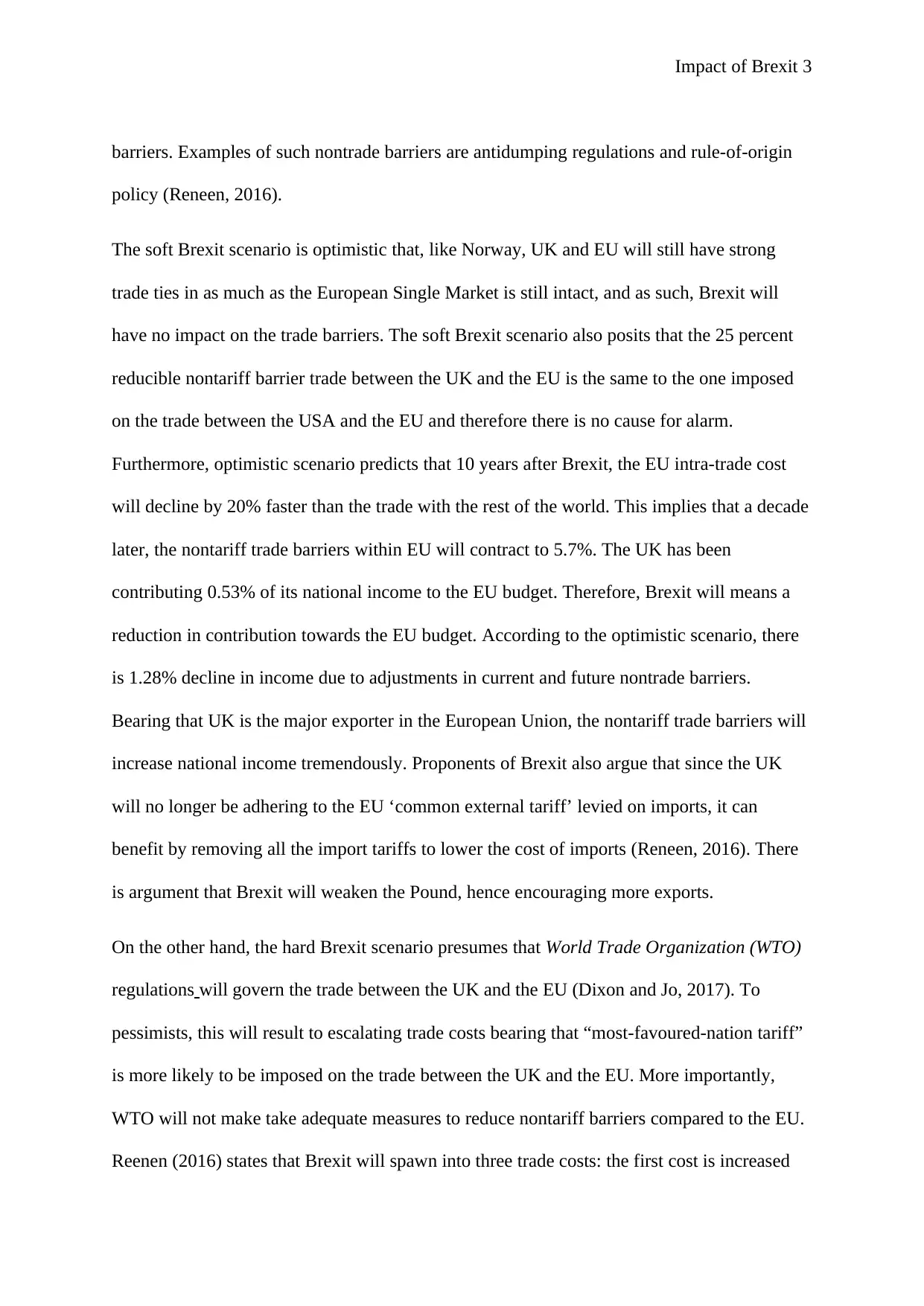
Impact of Brexit 3
barriers. Examples of such nontrade barriers are antidumping regulations and rule-of-origin
policy (Reneen, 2016).
The soft Brexit scenario is optimistic that, like Norway, UK and EU will still have strong
trade ties in as much as the European Single Market is still intact, and as such, Brexit will
have no impact on the trade barriers. The soft Brexit scenario also posits that the 25 percent
reducible nontariff barrier trade between the UK and the EU is the same to the one imposed
on the trade between the USA and the EU and therefore there is no cause for alarm.
Furthermore, optimistic scenario predicts that 10 years after Brexit, the EU intra-trade cost
will decline by 20% faster than the trade with the rest of the world. This implies that a decade
later, the nontariff trade barriers within EU will contract to 5.7%. The UK has been
contributing 0.53% of its national income to the EU budget. Therefore, Brexit will means a
reduction in contribution towards the EU budget. According to the optimistic scenario, there
is 1.28% decline in income due to adjustments in current and future nontrade barriers.
Bearing that UK is the major exporter in the European Union, the nontariff trade barriers will
increase national income tremendously. Proponents of Brexit also argue that since the UK
will no longer be adhering to the EU ‘common external tariff’ levied on imports, it can
benefit by removing all the import tariffs to lower the cost of imports (Reneen, 2016). There
is argument that Brexit will weaken the Pound, hence encouraging more exports.
On the other hand, the hard Brexit scenario presumes that World Trade Organization (WTO)
regulations will govern the trade between the UK and the EU (Dixon and Jo, 2017). To
pessimists, this will result to escalating trade costs bearing that “most-favoured-nation tariff”
is more likely to be imposed on the trade between the UK and the EU. More importantly,
WTO will not make take adequate measures to reduce nontariff barriers compared to the EU.
Reenen (2016) states that Brexit will spawn into three trade costs: the first cost is increased
barriers. Examples of such nontrade barriers are antidumping regulations and rule-of-origin
policy (Reneen, 2016).
The soft Brexit scenario is optimistic that, like Norway, UK and EU will still have strong
trade ties in as much as the European Single Market is still intact, and as such, Brexit will
have no impact on the trade barriers. The soft Brexit scenario also posits that the 25 percent
reducible nontariff barrier trade between the UK and the EU is the same to the one imposed
on the trade between the USA and the EU and therefore there is no cause for alarm.
Furthermore, optimistic scenario predicts that 10 years after Brexit, the EU intra-trade cost
will decline by 20% faster than the trade with the rest of the world. This implies that a decade
later, the nontariff trade barriers within EU will contract to 5.7%. The UK has been
contributing 0.53% of its national income to the EU budget. Therefore, Brexit will means a
reduction in contribution towards the EU budget. According to the optimistic scenario, there
is 1.28% decline in income due to adjustments in current and future nontrade barriers.
Bearing that UK is the major exporter in the European Union, the nontariff trade barriers will
increase national income tremendously. Proponents of Brexit also argue that since the UK
will no longer be adhering to the EU ‘common external tariff’ levied on imports, it can
benefit by removing all the import tariffs to lower the cost of imports (Reneen, 2016). There
is argument that Brexit will weaken the Pound, hence encouraging more exports.
On the other hand, the hard Brexit scenario presumes that World Trade Organization (WTO)
regulations will govern the trade between the UK and the EU (Dixon and Jo, 2017). To
pessimists, this will result to escalating trade costs bearing that “most-favoured-nation tariff”
is more likely to be imposed on the trade between the UK and the EU. More importantly,
WTO will not make take adequate measures to reduce nontariff barriers compared to the EU.
Reenen (2016) states that Brexit will spawn into three trade costs: the first cost is increased
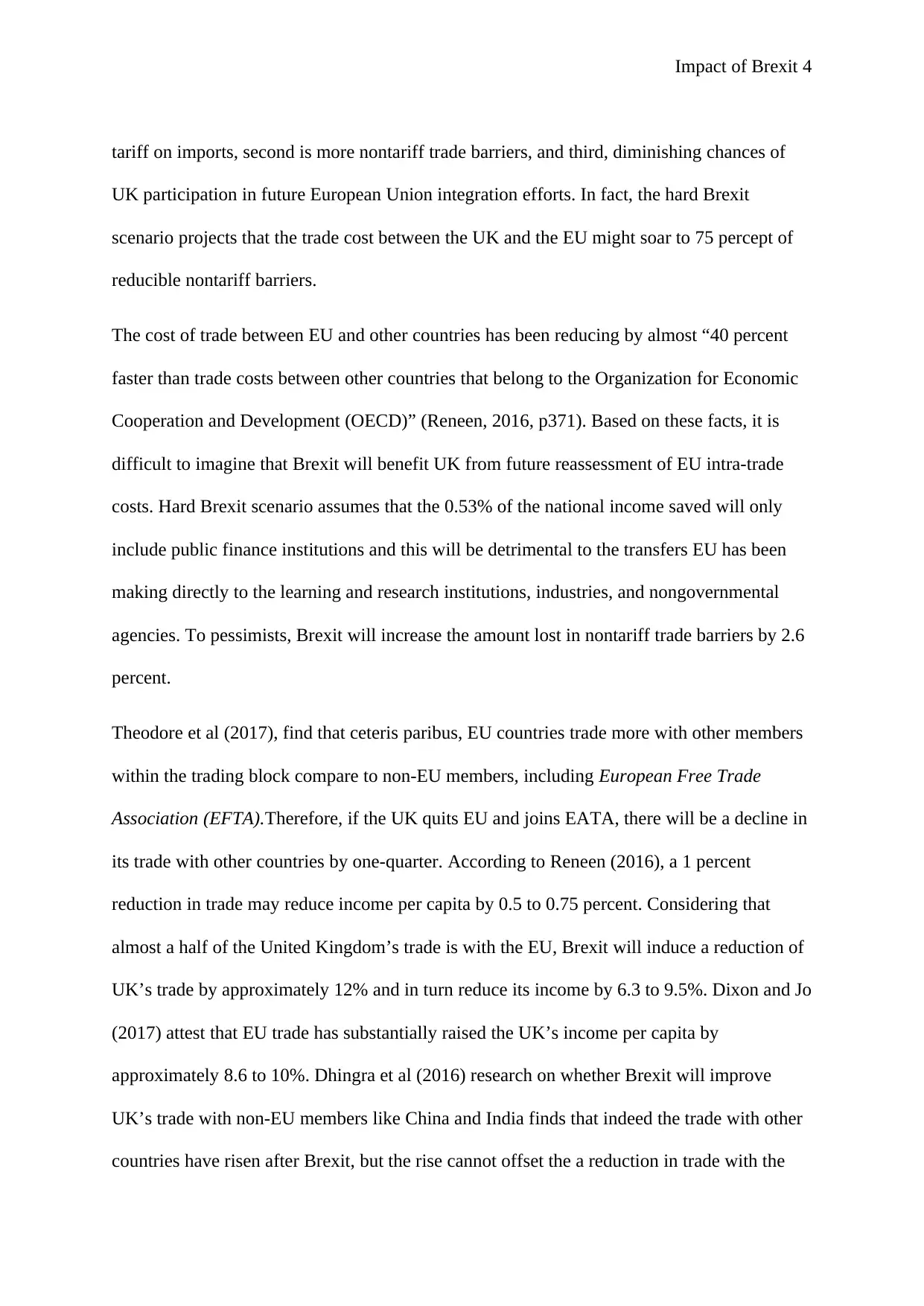
Impact of Brexit 4
tariff on imports, second is more nontariff trade barriers, and third, diminishing chances of
UK participation in future European Union integration efforts. In fact, the hard Brexit
scenario projects that the trade cost between the UK and the EU might soar to 75 percept of
reducible nontariff barriers.
The cost of trade between EU and other countries has been reducing by almost “40 percent
faster than trade costs between other countries that belong to the Organization for Economic
Cooperation and Development (OECD)” (Reneen, 2016, p371). Based on these facts, it is
difficult to imagine that Brexit will benefit UK from future reassessment of EU intra-trade
costs. Hard Brexit scenario assumes that the 0.53% of the national income saved will only
include public finance institutions and this will be detrimental to the transfers EU has been
making directly to the learning and research institutions, industries, and nongovernmental
agencies. To pessimists, Brexit will increase the amount lost in nontariff trade barriers by 2.6
percent.
Theodore et al (2017), find that ceteris paribus, EU countries trade more with other members
within the trading block compare to non-EU members, including European Free Trade
Association (EFTA).Therefore, if the UK quits EU and joins EATA, there will be a decline in
its trade with other countries by one-quarter. According to Reneen (2016), a 1 percent
reduction in trade may reduce income per capita by 0.5 to 0.75 percent. Considering that
almost a half of the United Kingdom’s trade is with the EU, Brexit will induce a reduction of
UK’s trade by approximately 12% and in turn reduce its income by 6.3 to 9.5%. Dixon and Jo
(2017) attest that EU trade has substantially raised the UK’s income per capita by
approximately 8.6 to 10%. Dhingra et al (2016) research on whether Brexit will improve
UK’s trade with non-EU members like China and India finds that indeed the trade with other
countries have risen after Brexit, but the rise cannot offset the a reduction in trade with the
tariff on imports, second is more nontariff trade barriers, and third, diminishing chances of
UK participation in future European Union integration efforts. In fact, the hard Brexit
scenario projects that the trade cost between the UK and the EU might soar to 75 percept of
reducible nontariff barriers.
The cost of trade between EU and other countries has been reducing by almost “40 percent
faster than trade costs between other countries that belong to the Organization for Economic
Cooperation and Development (OECD)” (Reneen, 2016, p371). Based on these facts, it is
difficult to imagine that Brexit will benefit UK from future reassessment of EU intra-trade
costs. Hard Brexit scenario assumes that the 0.53% of the national income saved will only
include public finance institutions and this will be detrimental to the transfers EU has been
making directly to the learning and research institutions, industries, and nongovernmental
agencies. To pessimists, Brexit will increase the amount lost in nontariff trade barriers by 2.6
percent.
Theodore et al (2017), find that ceteris paribus, EU countries trade more with other members
within the trading block compare to non-EU members, including European Free Trade
Association (EFTA).Therefore, if the UK quits EU and joins EATA, there will be a decline in
its trade with other countries by one-quarter. According to Reneen (2016), a 1 percent
reduction in trade may reduce income per capita by 0.5 to 0.75 percent. Considering that
almost a half of the United Kingdom’s trade is with the EU, Brexit will induce a reduction of
UK’s trade by approximately 12% and in turn reduce its income by 6.3 to 9.5%. Dixon and Jo
(2017) attest that EU trade has substantially raised the UK’s income per capita by
approximately 8.6 to 10%. Dhingra et al (2016) research on whether Brexit will improve
UK’s trade with non-EU members like China and India finds that indeed the trade with other
countries have risen after Brexit, but the rise cannot offset the a reduction in trade with the
Secure Best Marks with AI Grader
Need help grading? Try our AI Grader for instant feedback on your assignments.
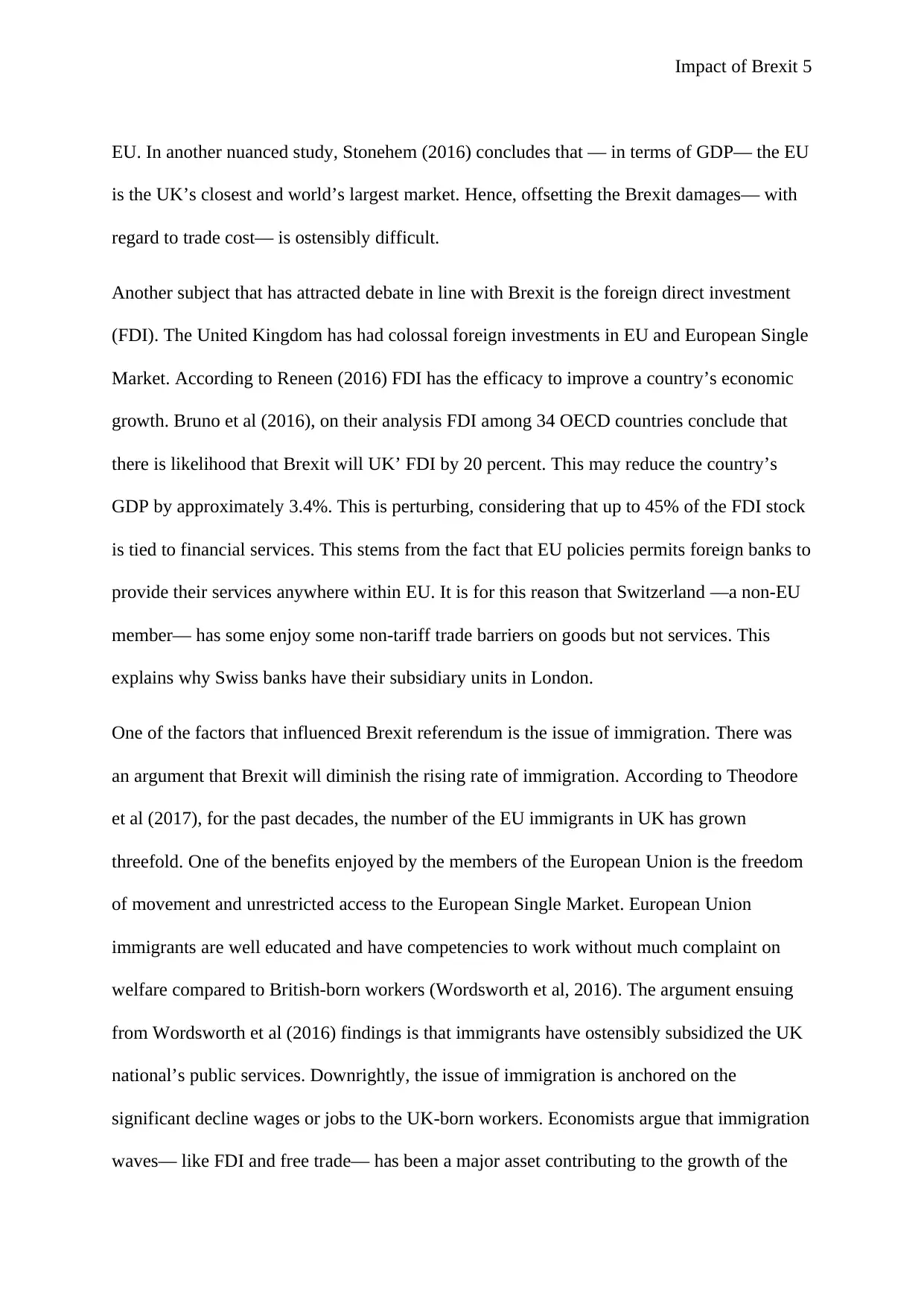
Impact of Brexit 5
EU. In another nuanced study, Stonehem (2016) concludes that — in terms of GDP— the EU
is the UK’s closest and world’s largest market. Hence, offsetting the Brexit damages— with
regard to trade cost— is ostensibly difficult.
Another subject that has attracted debate in line with Brexit is the foreign direct investment
(FDI). The United Kingdom has had colossal foreign investments in EU and European Single
Market. According to Reneen (2016) FDI has the efficacy to improve a country’s economic
growth. Bruno et al (2016), on their analysis FDI among 34 OECD countries conclude that
there is likelihood that Brexit will UK’ FDI by 20 percent. This may reduce the country’s
GDP by approximately 3.4%. This is perturbing, considering that up to 45% of the FDI stock
is tied to financial services. This stems from the fact that EU policies permits foreign banks to
provide their services anywhere within EU. It is for this reason that Switzerland —a non-EU
member— has some enjoy some non-tariff trade barriers on goods but not services. This
explains why Swiss banks have their subsidiary units in London.
One of the factors that influenced Brexit referendum is the issue of immigration. There was
an argument that Brexit will diminish the rising rate of immigration. According to Theodore
et al (2017), for the past decades, the number of the EU immigrants in UK has grown
threefold. One of the benefits enjoyed by the members of the European Union is the freedom
of movement and unrestricted access to the European Single Market. European Union
immigrants are well educated and have competencies to work without much complaint on
welfare compared to British-born workers (Wordsworth et al, 2016). The argument ensuing
from Wordsworth et al (2016) findings is that immigrants have ostensibly subsidized the UK
national’s public services. Downrightly, the issue of immigration is anchored on the
significant decline wages or jobs to the UK-born workers. Economists argue that immigration
waves— like FDI and free trade— has been a major asset contributing to the growth of the
EU. In another nuanced study, Stonehem (2016) concludes that — in terms of GDP— the EU
is the UK’s closest and world’s largest market. Hence, offsetting the Brexit damages— with
regard to trade cost— is ostensibly difficult.
Another subject that has attracted debate in line with Brexit is the foreign direct investment
(FDI). The United Kingdom has had colossal foreign investments in EU and European Single
Market. According to Reneen (2016) FDI has the efficacy to improve a country’s economic
growth. Bruno et al (2016), on their analysis FDI among 34 OECD countries conclude that
there is likelihood that Brexit will UK’ FDI by 20 percent. This may reduce the country’s
GDP by approximately 3.4%. This is perturbing, considering that up to 45% of the FDI stock
is tied to financial services. This stems from the fact that EU policies permits foreign banks to
provide their services anywhere within EU. It is for this reason that Switzerland —a non-EU
member— has some enjoy some non-tariff trade barriers on goods but not services. This
explains why Swiss banks have their subsidiary units in London.
One of the factors that influenced Brexit referendum is the issue of immigration. There was
an argument that Brexit will diminish the rising rate of immigration. According to Theodore
et al (2017), for the past decades, the number of the EU immigrants in UK has grown
threefold. One of the benefits enjoyed by the members of the European Union is the freedom
of movement and unrestricted access to the European Single Market. European Union
immigrants are well educated and have competencies to work without much complaint on
welfare compared to British-born workers (Wordsworth et al, 2016). The argument ensuing
from Wordsworth et al (2016) findings is that immigrants have ostensibly subsidized the UK
national’s public services. Downrightly, the issue of immigration is anchored on the
significant decline wages or jobs to the UK-born workers. Economists argue that immigration
waves— like FDI and free trade— has been a major asset contributing to the growth of the
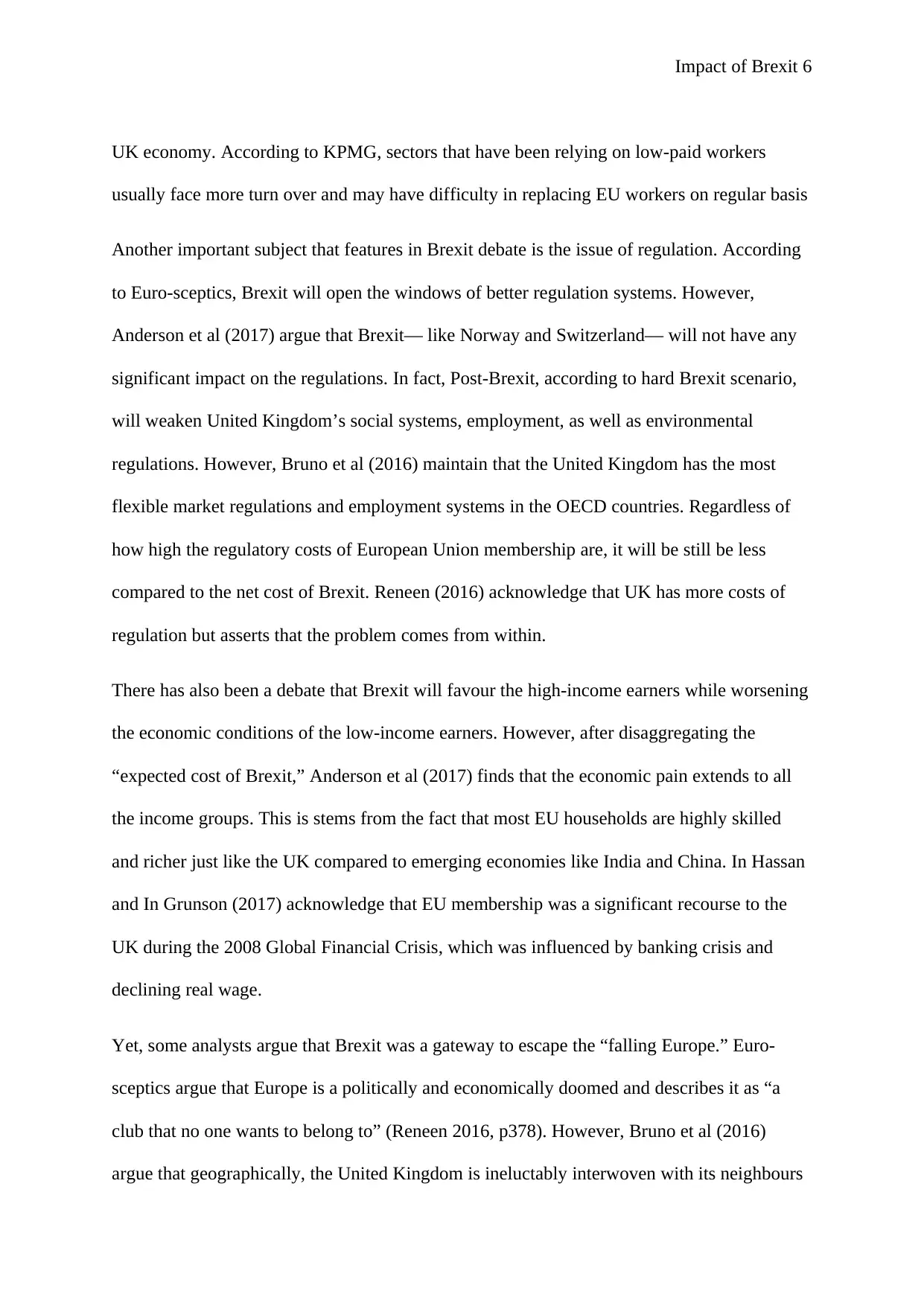
Impact of Brexit 6
UK economy. According to KPMG, sectors that have been relying on low-paid workers
usually face more turn over and may have difficulty in replacing EU workers on regular basis
Another important subject that features in Brexit debate is the issue of regulation. According
to Euro-sceptics, Brexit will open the windows of better regulation systems. However,
Anderson et al (2017) argue that Brexit— like Norway and Switzerland— will not have any
significant impact on the regulations. In fact, Post-Brexit, according to hard Brexit scenario,
will weaken United Kingdom’s social systems, employment, as well as environmental
regulations. However, Bruno et al (2016) maintain that the United Kingdom has the most
flexible market regulations and employment systems in the OECD countries. Regardless of
how high the regulatory costs of European Union membership are, it will be still be less
compared to the net cost of Brexit. Reneen (2016) acknowledge that UK has more costs of
regulation but asserts that the problem comes from within.
There has also been a debate that Brexit will favour the high-income earners while worsening
the economic conditions of the low-income earners. However, after disaggregating the
“expected cost of Brexit,” Anderson et al (2017) finds that the economic pain extends to all
the income groups. This is stems from the fact that most EU households are highly skilled
and richer just like the UK compared to emerging economies like India and China. In Hassan
and In Grunson (2017) acknowledge that EU membership was a significant recourse to the
UK during the 2008 Global Financial Crisis, which was influenced by banking crisis and
declining real wage.
Yet, some analysts argue that Brexit was a gateway to escape the “falling Europe.” Euro-
sceptics argue that Europe is a politically and economically doomed and describes it as “a
club that no one wants to belong to” (Reneen 2016, p378). However, Bruno et al (2016)
argue that geographically, the United Kingdom is ineluctably interwoven with its neighbours
UK economy. According to KPMG, sectors that have been relying on low-paid workers
usually face more turn over and may have difficulty in replacing EU workers on regular basis
Another important subject that features in Brexit debate is the issue of regulation. According
to Euro-sceptics, Brexit will open the windows of better regulation systems. However,
Anderson et al (2017) argue that Brexit— like Norway and Switzerland— will not have any
significant impact on the regulations. In fact, Post-Brexit, according to hard Brexit scenario,
will weaken United Kingdom’s social systems, employment, as well as environmental
regulations. However, Bruno et al (2016) maintain that the United Kingdom has the most
flexible market regulations and employment systems in the OECD countries. Regardless of
how high the regulatory costs of European Union membership are, it will be still be less
compared to the net cost of Brexit. Reneen (2016) acknowledge that UK has more costs of
regulation but asserts that the problem comes from within.
There has also been a debate that Brexit will favour the high-income earners while worsening
the economic conditions of the low-income earners. However, after disaggregating the
“expected cost of Brexit,” Anderson et al (2017) finds that the economic pain extends to all
the income groups. This is stems from the fact that most EU households are highly skilled
and richer just like the UK compared to emerging economies like India and China. In Hassan
and In Grunson (2017) acknowledge that EU membership was a significant recourse to the
UK during the 2008 Global Financial Crisis, which was influenced by banking crisis and
declining real wage.
Yet, some analysts argue that Brexit was a gateway to escape the “falling Europe.” Euro-
sceptics argue that Europe is a politically and economically doomed and describes it as “a
club that no one wants to belong to” (Reneen 2016, p378). However, Bruno et al (2016)
argue that geographically, the United Kingdom is ineluctably interwoven with its neighbours
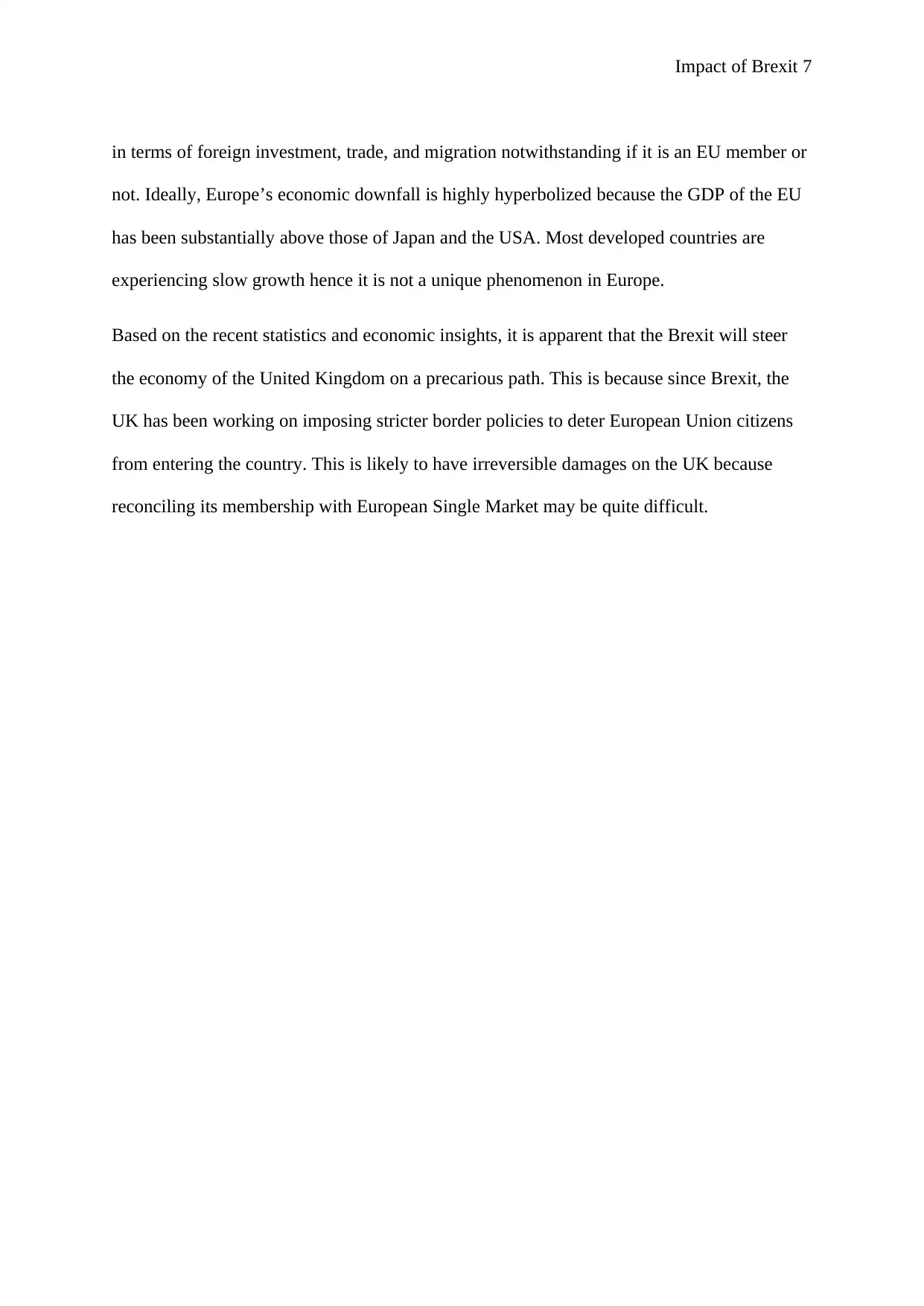
Impact of Brexit 7
in terms of foreign investment, trade, and migration notwithstanding if it is an EU member or
not. Ideally, Europe’s economic downfall is highly hyperbolized because the GDP of the EU
has been substantially above those of Japan and the USA. Most developed countries are
experiencing slow growth hence it is not a unique phenomenon in Europe.
Based on the recent statistics and economic insights, it is apparent that the Brexit will steer
the economy of the United Kingdom on a precarious path. This is because since Brexit, the
UK has been working on imposing stricter border policies to deter European Union citizens
from entering the country. This is likely to have irreversible damages on the UK because
reconciling its membership with European Single Market may be quite difficult.
in terms of foreign investment, trade, and migration notwithstanding if it is an EU member or
not. Ideally, Europe’s economic downfall is highly hyperbolized because the GDP of the EU
has been substantially above those of Japan and the USA. Most developed countries are
experiencing slow growth hence it is not a unique phenomenon in Europe.
Based on the recent statistics and economic insights, it is apparent that the Brexit will steer
the economy of the United Kingdom on a precarious path. This is because since Brexit, the
UK has been working on imposing stricter border policies to deter European Union citizens
from entering the country. This is likely to have irreversible damages on the UK because
reconciling its membership with European Single Market may be quite difficult.
Paraphrase This Document
Need a fresh take? Get an instant paraphrase of this document with our AI Paraphraser

Impact of Brexit 8
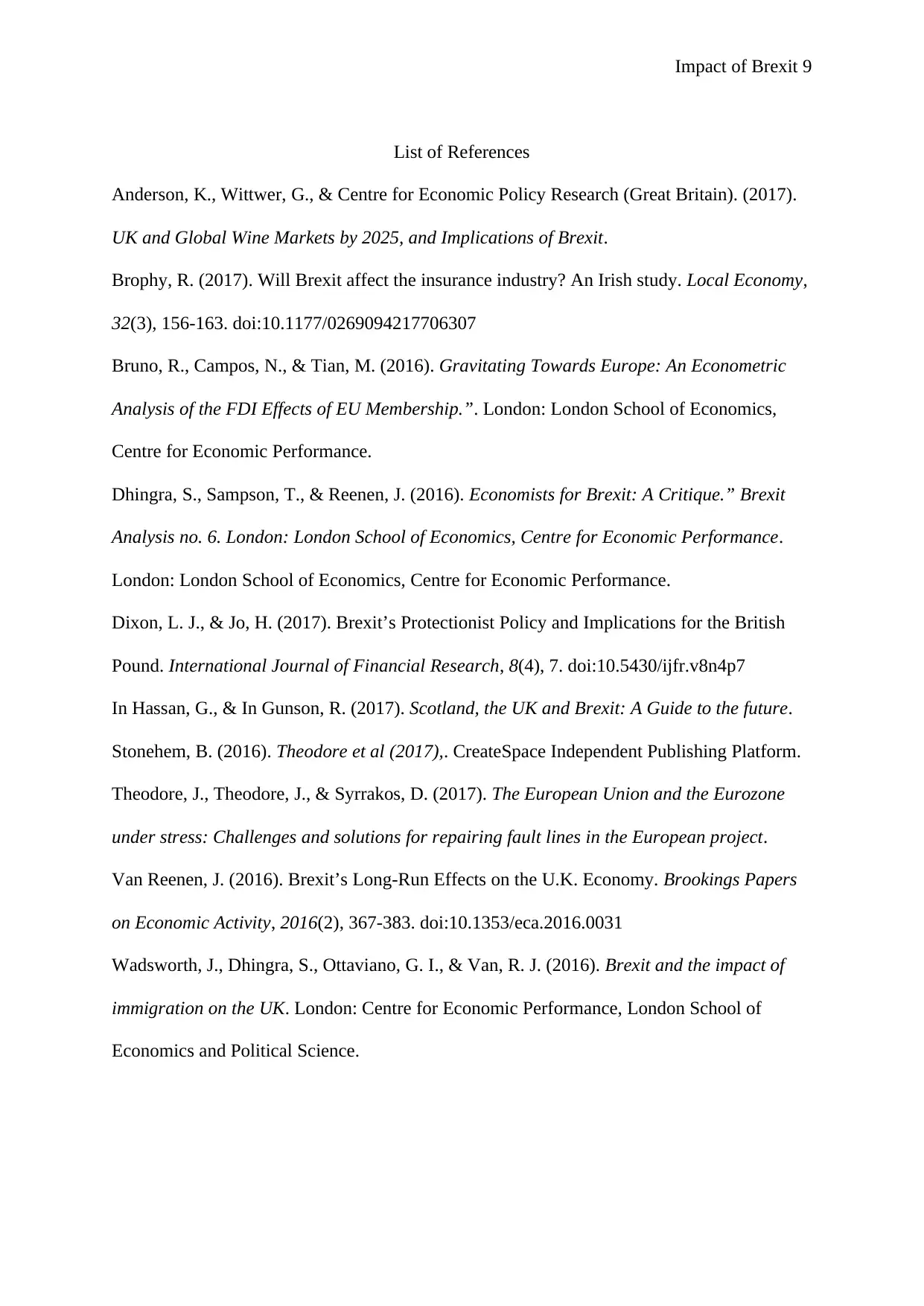
Impact of Brexit 9
List of References
Anderson, K., Wittwer, G., & Centre for Economic Policy Research (Great Britain). (2017).
UK and Global Wine Markets by 2025, and Implications of Brexit.
Brophy, R. (2017). Will Brexit affect the insurance industry? An Irish study. Local Economy,
32(3), 156-163. doi:10.1177/0269094217706307
Bruno, R., Campos, N., & Tian, M. (2016). Gravitating Towards Europe: An Econometric
Analysis of the FDI Effects of EU Membership.”. London: London School of Economics,
Centre for Economic Performance.
Dhingra, S., Sampson, T., & Reenen, J. (2016). Economists for Brexit: A Critique.” Brexit
Analysis no. 6. London: London School of Economics, Centre for Economic Performance.
London: London School of Economics, Centre for Economic Performance.
Dixon, L. J., & Jo, H. (2017). Brexit’s Protectionist Policy and Implications for the British
Pound. International Journal of Financial Research, 8(4), 7. doi:10.5430/ijfr.v8n4p7
In Hassan, G., & In Gunson, R. (2017). Scotland, the UK and Brexit: A Guide to the future.
Stonehem, B. (2016). Theodore et al (2017),. CreateSpace Independent Publishing Platform.
Theodore, J., Theodore, J., & Syrrakos, D. (2017). The European Union and the Eurozone
under stress: Challenges and solutions for repairing fault lines in the European project.
Van Reenen, J. (2016). Brexit’s Long-Run Effects on the U.K. Economy. Brookings Papers
on Economic Activity, 2016(2), 367-383. doi:10.1353/eca.2016.0031
Wadsworth, J., Dhingra, S., Ottaviano, G. I., & Van, R. J. (2016). Brexit and the impact of
immigration on the UK. London: Centre for Economic Performance, London School of
Economics and Political Science.
List of References
Anderson, K., Wittwer, G., & Centre for Economic Policy Research (Great Britain). (2017).
UK and Global Wine Markets by 2025, and Implications of Brexit.
Brophy, R. (2017). Will Brexit affect the insurance industry? An Irish study. Local Economy,
32(3), 156-163. doi:10.1177/0269094217706307
Bruno, R., Campos, N., & Tian, M. (2016). Gravitating Towards Europe: An Econometric
Analysis of the FDI Effects of EU Membership.”. London: London School of Economics,
Centre for Economic Performance.
Dhingra, S., Sampson, T., & Reenen, J. (2016). Economists for Brexit: A Critique.” Brexit
Analysis no. 6. London: London School of Economics, Centre for Economic Performance.
London: London School of Economics, Centre for Economic Performance.
Dixon, L. J., & Jo, H. (2017). Brexit’s Protectionist Policy and Implications for the British
Pound. International Journal of Financial Research, 8(4), 7. doi:10.5430/ijfr.v8n4p7
In Hassan, G., & In Gunson, R. (2017). Scotland, the UK and Brexit: A Guide to the future.
Stonehem, B. (2016). Theodore et al (2017),. CreateSpace Independent Publishing Platform.
Theodore, J., Theodore, J., & Syrrakos, D. (2017). The European Union and the Eurozone
under stress: Challenges and solutions for repairing fault lines in the European project.
Van Reenen, J. (2016). Brexit’s Long-Run Effects on the U.K. Economy. Brookings Papers
on Economic Activity, 2016(2), 367-383. doi:10.1353/eca.2016.0031
Wadsworth, J., Dhingra, S., Ottaviano, G. I., & Van, R. J. (2016). Brexit and the impact of
immigration on the UK. London: Centre for Economic Performance, London School of
Economics and Political Science.
1 out of 9
Related Documents
Your All-in-One AI-Powered Toolkit for Academic Success.
+13062052269
info@desklib.com
Available 24*7 on WhatsApp / Email
![[object Object]](/_next/static/media/star-bottom.7253800d.svg)
Unlock your academic potential
© 2024 | Zucol Services PVT LTD | All rights reserved.





